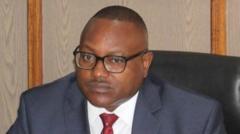Zambia's foreign minister, Mulambo Haimbe, has taken a firm stance against what he calls an "increasing tendency" among diplomats to communicate grievances through the media, a statement made shortly after US Ambassador Michael Gonzales raised alarms over the alleged "systematic theft" of donated medicines.
Haimbe's comments, while not directed at any specific individual, appeared to address the US ambassador’s recent press conference where Gonzales announced a $50 million reduction in health aid due to drug thefts affecting the southern African country. The US has expressed frustration following more than 30 unproductive meetings with Zambian officials regarding this issue.
In his statement, Haimbe emphasized that engaging the media rather than official diplomatic channels to resolve issues was a breach of established norms and could undermine respect between nations. He expressed Zambian openness to dialogue but urged that all concerns be submitted through the proper channels.
The US embassy indicated that its investigators had disclosed findings related to the alleged corruption to Zambian authorities back in April of the previous year, offering assistance in combatting theft and seeking justice for the culprits. However, the lack of response from Zambian authorities has been a point of contention.
Following these developments, Zambia's Home Affairs Minister Jacob Mwiimbu announced that a forensic audit related to the alleged pilfering had been completed, with the results now in the hands of security agencies for further action. Mwiimbu reported that approximately 75 individuals have been arrested during a nationwide operation targeting the fraud, which involved raids at over 400 health facilities.
The US ambassador elaborated that inspections of over 2,000 pharmacies had uncovered the illegal sale of medications and supplies donated by the US to address health crises such as malaria, HIV, and tuberculosis.
Zambia's Health Minister Elijah Muchima acknowledged that the issue of medical supply theft has been ongoing since before the current administration's tenure, and confirmed that numerous officials had already faced termination due to their involvement in the identified thefts. To address the situation moving forward, Zambia has implemented an advanced digital system to track medicine supplies.
The impending reduction in US aid is anticipated to influence public health programs but Muchima assured citizens that drug supplies remain stable, alleviating concerns about immediate shortages.
Additionally, this funding cut comes in conjunction with a broader foreign aid freeze previously enacted by former President Donald Trump, impacting numerous health initiatives across the African continent. The US is recognized as a critical supporter, accounting for about one-third of Zambia’s public health expenditures.
Haimbe's comments, while not directed at any specific individual, appeared to address the US ambassador’s recent press conference where Gonzales announced a $50 million reduction in health aid due to drug thefts affecting the southern African country. The US has expressed frustration following more than 30 unproductive meetings with Zambian officials regarding this issue.
In his statement, Haimbe emphasized that engaging the media rather than official diplomatic channels to resolve issues was a breach of established norms and could undermine respect between nations. He expressed Zambian openness to dialogue but urged that all concerns be submitted through the proper channels.
The US embassy indicated that its investigators had disclosed findings related to the alleged corruption to Zambian authorities back in April of the previous year, offering assistance in combatting theft and seeking justice for the culprits. However, the lack of response from Zambian authorities has been a point of contention.
Following these developments, Zambia's Home Affairs Minister Jacob Mwiimbu announced that a forensic audit related to the alleged pilfering had been completed, with the results now in the hands of security agencies for further action. Mwiimbu reported that approximately 75 individuals have been arrested during a nationwide operation targeting the fraud, which involved raids at over 400 health facilities.
The US ambassador elaborated that inspections of over 2,000 pharmacies had uncovered the illegal sale of medications and supplies donated by the US to address health crises such as malaria, HIV, and tuberculosis.
Zambia's Health Minister Elijah Muchima acknowledged that the issue of medical supply theft has been ongoing since before the current administration's tenure, and confirmed that numerous officials had already faced termination due to their involvement in the identified thefts. To address the situation moving forward, Zambia has implemented an advanced digital system to track medicine supplies.
The impending reduction in US aid is anticipated to influence public health programs but Muchima assured citizens that drug supplies remain stable, alleviating concerns about immediate shortages.
Additionally, this funding cut comes in conjunction with a broader foreign aid freeze previously enacted by former President Donald Trump, impacting numerous health initiatives across the African continent. The US is recognized as a critical supporter, accounting for about one-third of Zambia’s public health expenditures.

















